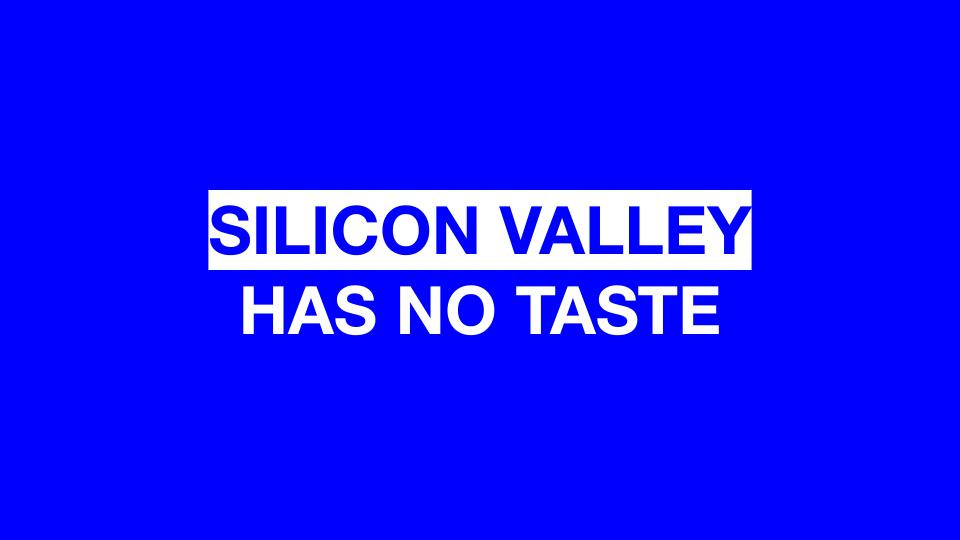Hey, friends—welcome back to online-offline, a newsletter about technology, culture, and the future. Today, some thoughts about taste, or lack thereof. Yes, the title is intentionally spicy but is it true? You tell me. Thank you Anu for bringing this word back and spurring discourse. If you have takes or want to chat, my email and DMs are open. If you haven’t already, please support my work by subscribing below. Now, let’s dive in.
Fifty years ago, a young man took a calligraphy class from a monk that seemed inconsequential until ten years later when he merged that calligraphy knowledge with software to create a little company called Apple. Without that class “the Mac would never have multiple typefaces or proportionally spaced fonts. And since Windows just copied the Mac, it's likely that no personal computer would have them.”
I’m no Steve Jobs fanboy but even I can admit the man had taste and respected craft.
Taste is how we reflect our opinions to the world. It’s a craft that’s earned through practice.
Every few months, people latch onto a new buzzword to explain the future of tech. The word is usually vague—there’s no shared definition, making it divisive by nature. Today’s buzzword? Taste.
Per my Twitter feed, taste is eating software. Yet, no one can define what taste is. Taste is creative and cultural discernment, earned with practice like learning code or mastering markets. Something can have good taste (Adam Sandler), no taste (Google), or bad taste (X.com). Taste is a spectrum of aesthetic appreciation.
Silicon Valley is hostile toward taste. Startups aren’t built by tastemakers anymore.
Contrary to the narrative, taste always mattered in software. Going back to Apple, some of the company’s earliest employees were historians, poets, and musicians who happened to be elite computer scientists. In the aughts, podcasters launched Twitter, designers made Airbnb, and photographers started building what’d become Instagram.
These days, technologists would rather be shape rotators than wordcels—and, calling someone nontechnical? An offense of the highest order. Tech doesn’t value culture or creative. This isolation is reflected in the products which, instead of being human-centered, are designed for growth and attention. X (fka Twitter) is a prime example. Twitter had curated content, an iconic brand (remember the fail whale?), and thoughtful features (conversation controls). X is a broken product with a flat brand and hostile UX—people you’ve blocked can now see your posts. I’d guess the org chart is filled with shape rotators; the wordcels were laid off or left.
Generally, tech lacks “taste” these days and that’s okay.
The startups with the highest market share in the last decade aren’t tastemakers but they’ve built good products by investing in research and talent. Does ChatGPT make me feel anything? No, but it works. Is TikTok tasteful? No, it’s bloated but the algorithm’s elite.
It seems we’re using taste as a proxy for UX, brand, design, growth, and community—elements imbued in product. Silicon Valley’s export is great software and hardware. AI may commoditize software but the relentless founder is motivated, not threatened, by changing tides. I still believe product is the final boss but if startups seek to improve things like brand then they must import (recruit) multidisciplinary, creative talent. Ultimately, founders who remain obsessed with their customers and products—their craft—will continue to succeed.
Founders are product and team builders. Taste manifests when both are done well.
Earlier this year, I gave a talk on how AI agents are our next muses (following this creator and influencer era). You can read the accompanying essay here, but In short:
While no AI is truly anthropomorphic, it is made in our (human) image. Generative AI seeks to be as or even more productive and creative than people. But, culture typically rises from the youth and there’s no such origination with AI. Cultural artifacts and references are key to technology.
So, I understand the desire to demand taste from technologists. I challenge us to dig a little deeper and demand what matters when it comes to software: exceptional product. The “nontechnical” founders who are building apps using ChatGPT rarely aspire to build venture-backed, generational companies. We should expect the best software engineers in the world—who are raising millions if not billions of dollars—to be product visionaries who have an edge on AI-generated software because they recruit cracked teams that masterfully craft visual stories. If both things are true, then taste is consequential.
It’s been fun watching people debate taste and who gatekeepers or arbiters of taste should be. Moments of cultural criticism like this remind me why I got into tech, but this is probably my first and last essay on taste. I enjoy frameworks and my friends have written excellent guides on this exact topic, which are linked below. Without frameworks and shared understanding, terms like taste are a distraction.
Just go build something, do stuff!
Special thanks to Kristy Tillman, Seyi Taylor, Khushi Suri, Abena Anim-Somuah, Adam Delehanty, Reggie James, Nick Susi, Keeks, and the many other conversations that influenced this essay. As always, thank you for reading! If you’re new to online-offline, make sure to subscribe.
Further reading
How to Develop Taste by Ruby Thelot
Sort by Controversial by Scott Alexander
How the Great Recession Infuenced a Decade of Design by Eliza Brooke








Great post; as much as taste is important, I still believe innovation in the product is more essential in driving adoption. Many products we use today were once breakthrough innovations (either tech or business model) while UX also played a crucial role.